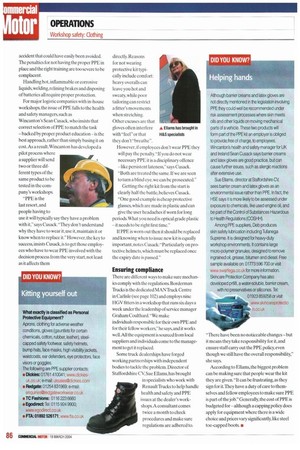Although barrier creams and latex gloves are not directly mentioned
Page 86

If you've noticed an error in this article please click here to report it so we can fix it.
in the legislation involving PPE they could well be recommended under risk assessment processes where skin meets oils and other liquids on moving mechanical parts of a vehicle. These two products will form part of the PPE kit an employer is obliged to provide.free of charge, to employees. Wincariton's health and safety manager for UK and Ireland Sean Cusack says barrier creams and latex gloves are good practice, but can cause further issues, such as allergic reactions after extensive use.
Sue Ellams, director at Staffordshire CV, sees barrier cream and latex gloves as an environmental issue rather than PPE. In fact, the HSE says it is more likely lobe assessed under exposure to chemicals, like used engine oil, and be part of the Control of Substances Hazardous to Health Regulations (COSHH).
Among PPE suppliers, Deb produces skin safety lubrication including Tufanega Supreme. It is designed for heavy-duty workshop environments. It contains large micro-polymer granules, designed to remove ingrained oil, grease, bitumen and diesel. Free sample available on: 01773 596 700 or visit www.swarfega.cc.uk for more information. Skincare Protection Company has also developed pr88, a water-soluble, barrier cream,
with no preservatives or silicones. Tel:
Imit01923 859258 or visit www.skIncareprotectio








































































































































































































































